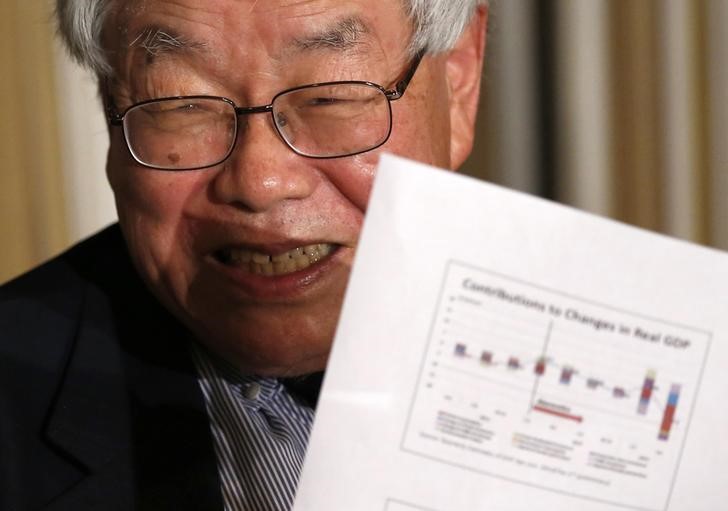By Kaori Kaneko and Sumio Ito
TOKYO (Reuters) - The Bank of Japan need not boost its massive monetary stimulus this week as the labour market remains tight, a key economic adviser to Prime Minister Shinzo Abe said on Monday.
Koichi Hamada, an emeritus professor of economics at Yale University, also told Reuters that the central bank does not have to rush into further easing but rather can monitor the prospects for an interest rate hike by the United States.
"As long as the jobs-to-applicant ratio and unemployment rate show the labour market remains tight, the BOJ can wait for a while," Hamada said in an interview.
"I will leave it up to BOJ Governor (Haruhiko) Kuroda," on monetary policy.
He also said market speculation that the Federal Reserve may raise U.S. rates is taking some pressure off Japan's central bank by keeping the yen soft.
The yen has hovered roughly between 119 yen and 121 yen per dollar
"As long as expectations for a U.S. interest rate hike keeps the yen weak, there is no need for BOJ Governor Kuroda to take action," Hamada said.
The BOJ is set to cut its rosy inflation forecasts in a semi-annual report due out on Friday, but many BOJ officials prefer to hold off on expanding its already massive stimulus programme, which has had limited success in accelerating inflation since being launched two-and-half years ago.
ADVOCATES CORPORATE TAX CUTS
To stimulate the economy, Prime Minister Shinzo Abe launched his "three arrows" in 2013 - bold monetary easing, fiscal spending and growth strategy - in a strategy dubbed "Abenomics".
His new arrows unveiled last month consist of a target to boost gross domestic product (GDP) to 600 trillion yen ($5 trillion), lift the fertility rate and pursue social welfare reforms.
"One of the problems for the Japanese economy is that people and businesses, in particular, are holding too much cash," Hamada said.
"Companies are not spending their money on capital expenditure, or wages, and they are not returning profits to shareholders."
Hamada said the government should trim the effective corporate tax rate - among the developed world's highest - to below 30 percent next fiscal year to encourage investment.
Japan lowered the corporate tax rate to 32.11 percent in the current fiscal year from 34.62 percent last fiscal year, and plans to reduce it to 31.33 percent next fiscal year.
"Under the tax competition going on in the world, piecemeal reductions do not work. Japan should cut its effective corporate tax below 30 percent next fiscal year."
Hamada said the government should implement steps, such as a reduced tax rate system or tax rebates, to offset the impact on low-income people if Japan raises a sales tax hike as scheduled.
Japan plans to raise the sales tax to 10 percent in April 2017 from 8 percent. The government increased the tax in April 2014, which damaged consumer spending.

"It is clear that people in the lowest income bracket are the most damaged by a sales tax hike. The government should not ignore those people, and accompany the sale tax hike with other necessary measures like income rebates."